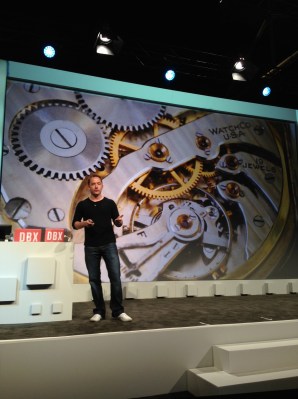One of the questions that came up a couple of times during the press Q&A at Dropbox’s DBX developer conference: What does today’s news mean for the company’s business model? Given the impressive user numbers and platform expansion announced today (including a new API to sync data between apps), could Dropbox try to make money from advertising? Or by charging developers?
Co-founder and CEO Drew Houston told reporters that’s not the plan. Instead, he wants to stick with the company’s existing business model, which involves charging subscription fees for pro and business users. In fact, he said that the simplicity of how Dropbox makes money is part of its appeal, because it means there should be fewer surprises down the road.
“You don’t have to look around and wonder where our money is coming from,” Houston said.
I’m not sure if the “you” in question was referring to consumers or developers. But I think it kind of applies either way, whether it’s a consumer worried about Dropbox selling their user data or covering the site in ads, or a developer worried that they’re going to end up competing with Dropbox down the line. Houston’s other answers addressed these possible developer concerns explicitly, saying that the company will stay focused on creating its “core experiences” as good and as simple as possible. And on user data, he also said that Dropbox has specific terms covering how it responds to government requests for data, and that it has been expanding its security team.
Monetization came up again a few minutes later, when Houston was asked specifically whether he’d consider charging developers, particularly if the platform expansion increases Dropbox’s costs significantly. Once again, the answer was no.
“We’ve never taken money from developers and we don’t have any plans to,” Houston said. That doesn’t necessarily mean that Dropbox will never, ever do it (“it’s conceivable that there would be services in the future where there would be some cost associated with the developer”). But, he added, “because we have a strong core business model, I don’t think that monetizing developers will be an important thing for us for the foreseeable future.”
